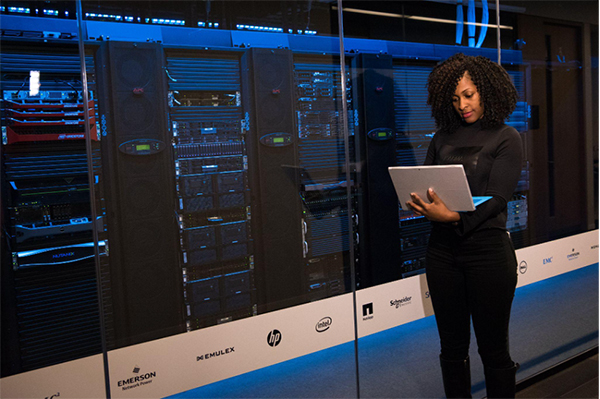Navigating the nexus of human intelligence, AI, and data security and future trajectories for a resilient cybersecurity future.
Within the rapidly evolving business ecosystem, the confluence of human intelligence, AI, and data security stands as both a catalyst for innovation and an indicator of intricate technical and ethical issues. The contemporary market, forecasted to witness a staggering 37.3% annual growth rate in AI from 2023 to 2030, necessitates a profound understanding of this relationship. This introduction delves into the technicalities and ethical considerations that enterprises must strategically navigate to harness AI’s potential in an increasingly interconnected business landscape.
The technical synergy between AI and data security is a compelling narrative of modern cybersecurity, where advanced machine learning models, cutting-edge encryption techniques, and innovative data privacy methodologies converge to create robust security architectures. As AI systems evolve, they bring about sophisticated tools and strategies, such as:
1. Anomaly Detection With ML Models
Machine learning models trained to detect anomalous behavior are critical in identifying potential threats. Techniques range from semi-supervised methods, employing models like One Class SVM, to deep learning and graph-based approaches that scrutinize data for signs of unusual activity. These models are vital for predictive analytics in cybersecurity, providing organizations with the ability to anticipate and respond to potential threats proactively.
2. AI-Driven Encryption and Key Management
AI-driven encryption techniques are redefining data protection by leveraging machine learning and deep learning methods to dynamically manage encryption keys and adapt to evolving security risks. These intelligent systems are designed to detect and respond to abnormal patterns, automatically adjusting encryption strength to safeguard sensitive data against unauthorized access and potential breaches.
3. Federated Learning and Privacy-Preserving Technologies
Federated learning represents a paradigm shift in data security for AI model training. Decentralizing the training process ensures that sensitive data remains on local devices, reducing the risks associated with data centralization. Complementing federated learning is differential privacy and homomorphic encryption techniques, which allow for the analysis and training of encrypted data, thereby preserving the privacy of the underlying information.

Balancing the need for data accessibility with robust security protocols is a delicate and complex task. Sophisticated access control mechanisms, AI-powered behavior analysis, and continuous training are the cornerstones of a secure data environment.
A staggering 95% of cybersecurity breaches are due to human error. Hence, sophisticated access control systems are crucial for maintaining stringent data security. These systems must authenticate and authorize individuals, ensuring they access only the information they’re entitled to, thereby preventing over-privileged access, which is implicated in numerous breaches. For instance, IBM’s X-Force Red team highlights that in every data breach, access controls are among the first policies scrutinized. Access control must be dynamic, adapting to the changing risk landscapes and incorporating AI and machine learning to analyze user behavior and adjust access rights in real-time.
Similarly, AI’s prowess in behavior analysis has become an essential tool in identifying security risks and insider threats. It distinguishes between normal and anomalous user activities, addressing the limitations of traditional, rule-based security systems. AI can process and analyze immense data volumes, recognizing subtle patterns indicative of malicious intent.
Furthermore, periodic training with AI-powered training modules is imperative for cybersecurity readiness. AI-driven simulations offer realistic and up-to-date scenarios that enhance security professionals’ skills and adaptability to current attack vectors. The tailored learning experiences provided by AI can significantly improve knowledge retention and skill development.
The integration of these elements forms a robust defense, ensuring that as the digital environment becomes more complex, the human components within it are equipped to maintain the integrity and confidentiality of critical data.
The ethical considerations around AI decisions and data privacy are becoming increasingly prominent. With AI’s expanding role in decision-making processes, the call for transparent, unbiased AI models is critical, as is the ability to trace and understand the reasoning behind AI-driven decisions.
Anticipating the trajectory of AI-driven security paradigms involves understanding the impact of quantum technologies, considering the evolving ethical landscape, and forecasting the symbiotic roles of humans and AI.
According to Deloitte Insights, the financial services industry’s investment in quantum computing is projected to surge from US$80 million in 2022 to US$19 billion by 2032, representing a compound annual growth rate of 72%. This staggering growth underscores the urgency for industries to develop quantum-resistant security measures. The intersection of quantum mechanics and cybersecurity portends a future where existing encryption protocols may become obsolete, necessitating the adoption of quantum-safe cryptography to secure sensitive financial data against the formidable processing power of quantum computers.
In an AI-augmented future, the role of humans in decision-making and oversight will evolve. Humans will be essential in providing context, emotional intelligence, and ethical judgment that AI lacks. The interplay between human intuition and AI’s data-driven insights will redefine professional roles across industries, ensuring that AI serves to enhance, not replace, human expertise.
As we navigate through the evolving landscape of cybersecurity, the role of AI is becoming indisputably central. The fusion of human insight with AI’s analytical prowess is crafting a future where security is not just reactive but preemptive, and where ethical considerations are as intrinsic as technical ones. From the granular level of encryption to the macro scale of regulatory compliance, the integration of AI in security protocols promises a smarter, more resilient defense against the cyber threats of tomorrow. Ensuring this future benefits society requires a steadfast commitment to advancing AI’s capabilities while steadfastly upholding ethical standards and fostering human-AI collaboration.

Mike Gunion, VP for Sales & Marketing Infinit-O
Passionate, high-energy senior executive business leader, entrepreneur, cross-functional team leader, motivator & innovator. Mike is focused on results, building winning processes, teams, and execution plans. Broad-based skills built and applied across Clean Tech, Medical Equipment, Telecommunications, Information Technology, IoT, Financial Services, Manufacturing, and HVAC industries. Successful in enterprises large and small, building and growing businesses from VC-backed start-up ventures to running P&Ls in Fortune 500 firms with hundreds of employees. Deep background and interest in developing and scaling technology-based product and service businesses – from strategy development through operational and financial planning. Particular interest in AI and IoT.
Scott Ellyson, CEO of East West Manufacturing, brings decades of global manufacturing and supply chain leadership to the conversation. In this episode, he shares practical insights on scaling operations, navigating complexity, and building resilient manufacturing networks in an increasingly connected world.